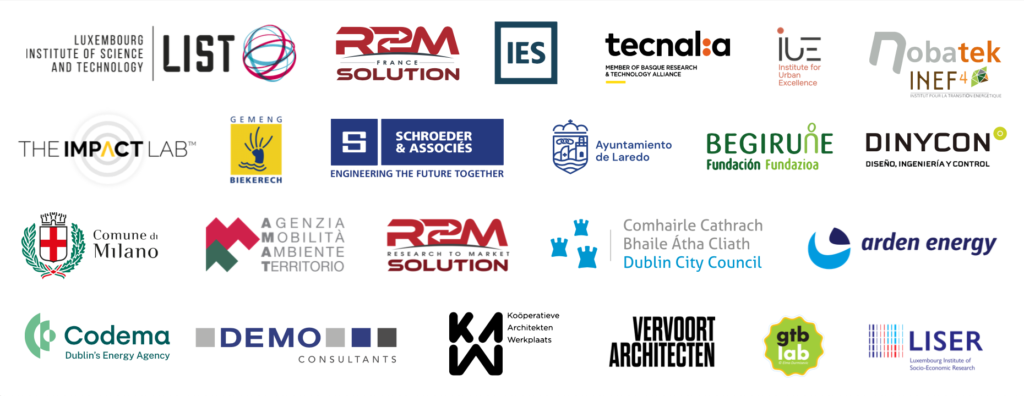REGEN – Regeneration of neighbourhoods towards a low-carbon, inclusive and affordable built environment: Dublin, Milan, Beckerich and Laredo
Buildings, and the manner in which we design, construct and maintain them are a significant contributor to the climate breakdown that we are witnessing. Restorative and regenerative approaches can flip this phenomenon, enabling buildings, neighbourhoods and the broader built environment to become part of a broad climate regeneration solution. Aligned with the latest policies, REGEN’s holistic Assessment Framework for Urban Regeneration (AFUR) will lead to environmental sustainability, economic revitalization and social inclusion driven by revisited participative urban planning and management approaches.
REGEN is co-financed by the European Commission’s Built4People partnership.
Within the next four years, this 7.5M€ Innovation Action project co-funded by the European Commission will represent a paradigm shift in urban regeneration, merging technological innovation with community engagement to create sustainable and thriving urban environments. By fostering collaboration, harnessing digital tools, and prioritising the needs of end-users, REGEN is poised to drive lasting change across Europe. In four demonstration sites (Milan (IT), Dublin (IE), Beckerich (LUX) and Laredo (ES)), urban areas will be regenerated preserving heritage and integrating new infrastructures while transforming citizen habits and aspirations. AFUR will support city stakeholders towards robust and sustainable decarbonisation pathways, strengthening their resilience to climate change through the implementation of selected regeneration interventions. Co-designed with stakeholders, new participatory processes and digital tool solutions will revitalise and rejuvenate underutilised or underdeveloped areas, improving the quality of life for residents, and attracting new investment and economic activity.
A multidisciplinary team formed by experts from both academia and industry
The consortium is formed by 23 European partners and is coordinated by Sylvain Kubicki, from Luxembourg Institute of Science and Technology (LIST).This includes four Research and Technology Organisations with a rich portfolio in research and innovation in the areas of environmental science, information and communication technology and material science (LIST), analysis of social changes (LISER), applied research and technological development on quality of life, energy transition and urban ecosystem(TECNALIA), sustainable development and innovation in the fields of construction, energy and environment (NBK). Additionally, the consortium includes four public organisations representing a municipality from the four REGEN demonstration sites of Beckerich, Laredo, Milan and Dublin (BECK, LAREDO, MIL, DDC and CODEMA) and two private organisations, focusing on mobility, environment and territory (AMAT) and with city and regional planning expertise (ISOC). Finally, the consortium is complemented by a metrology SMEs with strong knowhow in software and consulting services for sustainable building design and environmental performance analysis (IES), monitoring impact measurement frameworks (TIL), carrying out specific studies by collaboration with engineers and architects (S&A), creating of knowledge and its transfer to society in the specific field of migrations and in the general field of social research (BEGI), capacity management and people counting (DINYCON), research and innovation in the field of sustainable development and energy transition (R2M FR) and (R2M IT), integrating electricity supply with energy management services (ARDEN), real estate information management (DMO), architectural design firms (KAW) and (VAR), realizing innovative building systems (GTB).

Learn more at Social Innovation Academy
Social Innovation Academy is the first fully online management training programme focusing exclusively on social innovation.
Why Social Innovation Academy? Social innovation has increasingly come to be perceived as the answer to the rising number of European societal challenges. While the European authorities, leading academics, policy experts, business people and activists agree that social innovation is the key to a better future for Europe and the world, it is extremely difficult for professionals to obtain high-quality training on what social innovation actually offers and, more importantly, how it can be done in practice.
The Social Innovation Academy is aiming to change this situation in Europe and beyond. If you are interested in keeping up with this project, you can subscribe to our newsletter, become one of our friends or follow us on social media (LinkedIn, Twitter and Facebook). We welcome all requests for collaboration here.
Graphic and text: REGEN
Subscribe to Social Innovation Academy updates

